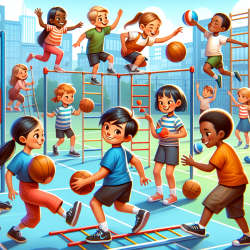As educators and therapists, we are constantly seeking innovative ways to support children's cognitive development. A recent study sheds light on an exciting method: coordinative training. This approach not only boosts physical fitness but also significantly enhances attentional performance in children, regardless of their weight status.
Understanding Coordinative Training
Coordinative training involves exercises that require simultaneous physical and cognitive engagement. This type of training includes activities such as sports games, rhythmic exercises, gymnastics, and fitness activities that challenge both the body and mind. The complexity of these exercises stimulates the prefrontal cortex, a brain area crucial for attention and executive functions.
The Study: Key Findings
The research involved 157 primary school children divided into three groups: Traditional Physical Activity (PA), Coordinative PA, and a Control group. Over five months, children participated in structured PA sessions twice a week. The results were telling:
- Improved Attention: Both Traditional and Coordinative PA groups showed significant improvements in attention span compared to the Control group.
- Concentration Gains: The Coordinative PA group exhibited the most significant enhancements in concentration and accuracy.
- No Weight Bias: Improvements were observed regardless of the children's weight status, highlighting the universal benefits of coordinative exercises.
Implementing Coordinative Training in Schools
Here are some practical steps for educators and therapists to incorporate coordinative training into their programs:
- Diverse Activities: Integrate a mix of sports games, rhythmic exercises, and gymnastics into PE classes. This variety keeps students engaged and challenges different cognitive skills.
- Focus on Complexity: Design activities that require problem-solving and decision-making. For example, modify traditional games by adding new rules or constraints that require strategic thinking.
- Monitor Progress: Use attention tests like the d2-R test to measure improvements in students' concentration and processing speed over time.
- Create Inclusive Programs: Ensure activities are adaptable for all fitness levels so every child can participate and benefit from the cognitive boosts provided by coordinative exercises.
The Broader Impact on Education
The study's findings suggest that incorporating coordinative training into school curriculums can have long-lasting effects on children's academic performance. Enhanced attention and concentration translate to better learning outcomes, improved classroom behavior, and greater overall success in school.
Encouraging Further Research
This study opens up numerous avenues for further exploration. Researchers are encouraged to delve deeper into how specific types of coordinative exercises affect different cognitive functions. Additionally, investigating the long-term impacts on academic achievement could provide valuable insights into optimizing educational strategies.
For practitioners eager to explore this field further, consider collaborating with local schools to implement pilot programs or conducting your own research studies to contribute to this growing body of knowledge.
To read the original research paper, please follow this link: Impacts of coordinative training on normal weight and overweight/obese children’s attentional performance.










